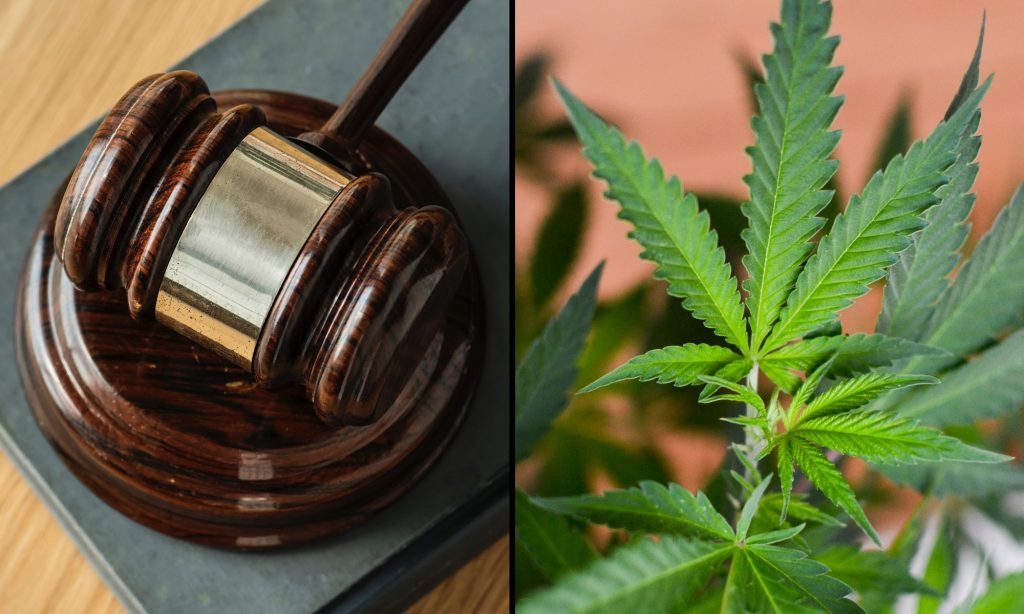
Examining the Recent Developments in United States v. Sirois
The legal landscape surrounding state-compliant marijuana operations has long been a labyrinth of twisted issues, nerve-racking legal challenges, and subtle details that often leave even the most seasoned operators scratching their heads. In recent months, the case of United States v. Sirois has resurfaced with fresh twists and turns—raising concerns about federal overreach and the implications of longstanding legislative safeguards such as the Rohrabacher-Farr Amendment. In this opinion editorial, we take a closer look at the latest developments in the Sirois case and the broader issues it raises for state-legal cannabis businesses.
As many in the legal and regulatory community already know, the Sirois Defendants, who run a medical marijuana cultivation and processing operation in Maine, have been embroiled in a heated dispute over whether their state-compliant activities should shield them from federal prosecution. Now that the Defendants have petitioned the U.S. Supreme Court for review, a split between the Ninth and Eleventh Circuit precedents has come sharply into focus, propelling this case into a critical juncture. What might seem like a textbook dispute over the fine points of compliance and state versus federal authority has, in reality, become a battleground addressing some of the trickiest parts of marijuana law in the United States.
Understanding the Historical Context: The Rohrabacher-Farr Amendment
Before we get into the nitty-gritty of United States v. Sirois, it’s important to recall the background of the Rohrabacher-Farr Amendment—a super important legislative rider first enacted in 2014. This amendment prevents the Department of Justice (DOJ) from using federal funds to investigate or prosecute medical marijuana operations that comply with state law. Its passage was intended to alleviate the nerve-racking fear that state-legal operators might face arbitrary federal intervention.
However, the protections afforded by this amendment come with a few expansive twists and turns:
- Limited Scope: The amendment applies strictly to medical marijuana operations and does not extend to adult-use or recreational businesses, leaving a chasm between different sectors of the legal cannabis industry.
- State versus Federal Boundaries: Even when a business is compliant under state law, federal law still marks marijuana as an illegal substance, leaving operators caught between tangled issues at both levels.
- Operational Ambiguities: Disputes have long emerged over what constitutes “substantial compliance” with state laws. In Sirois, the Defendants argue that they not only met state requirements but also that much of the current legal framework is loaded with confusing bits that magnify the risk for businesses.
In essence, while the Rohrabacher-Farr Amendment provides a shield against certain types of federal action, it falls short of offering an ironclad defense. This gap is now at the heart of the Sirois proceedings, as the operators contend that federal enforcement is not just an overstep by the DOJ, but is also fundamentally out of harmony with congressional intent.
Decoding the Legal Arguments in United States v. Sirois
Digging into the arguments laid out in the Sirois petition, several key points emerge. The Defendants maintain that their state-compliant operations should logically equip them with protection against federal prosecution. They further contend that the current burden of proof on them—forcing them to prove conformity with a labyrinthine state regulatory scheme—is not only intimidating but also at odds with basic fairness in legal proceedings.
Let’s take a closer look at some of the subtle details of their arguments:
- Burden of Proof Shift: The petition calls for a shift from requiring the defendant to prove that they acted in compliance, to compelling the DOJ to demonstrate noncompliance. In other words, the Defendants argue that if their activities are legal under state law, the federal investigators should bear the burden of proving otherwise.
- The Role of Circuit Precedents: With a noticeable split between the rulings in the Ninth and Eleventh Circuits, this case creates a patchwork of legal interpretations that could ripple through subsequent disputes. Such a division demands a Supreme Court ruling that could potentially set a uniform standard for what “substantial compliance” means.
- State Licensed Operations: The Defendants assert that state-licensed and authorized medical marijuana operators should be able to operate with a reasonable expectation of safety from overzealous or misguided federal interference.
Critics of the current system argue that this imbalance forces operators to incur extra costs and administrative headaches as they strive to prove that they are within the fine shade of compliance. Many see this not as an onerous extra burden, but as an unnecessary and overwhelming complication that stifles innovation and disrupts a burgeoning industry.
Federal Overreach and Its Impact on State-Allowed Operations
The Sirois case also magnifies a broader conversation about meaningful federal oversight versus intrusive government action. While proponents of strict federal control argue that marijuana should remain illegal under the Controlled Substances Act, many critics—and indeed, many state-legal operators—view federal interference as a scary and off-putting imposition on businesses that are otherwise operating within well-accepted state laws.
This tension raises several significant issues:
- Legal Uncertainty: With state-legal systems offering clear guidelines and federal law remaining stubbornly outdated, operators find themselves caught between conflicting sets of rules. This not only sows confusion but also puts businesses at a considerable risk of unexpected convictions.
- Economic Consequences: The commercial ramifications of such federal overreach are enormous. When businesses are forced to expend resources to prove compliance—or worse, face the threat of punitive action—they have less capital available for growth, innovation, and job creation.
- Regulatory Overload: The current duality in law enforcement leaves operators to tackle a series of complicated pieces. It becomes necessary for them to spend valuable time and money managing regulatory challenges instead of focusing on customer service or new product development.
In many ways, the Sirois case stands as a microcosm for the broader debate: Should federal law dictate the boundaries of acceptable behavior for state-legal industries, or should there be more flexibility to let local governance take the lead? This is a question that continues to incite heated debate within legal circles and amongst cannabis entrepreneurs alike.
Reckoning with the Implications Beyond the Courtroom
While it is too early to predict what the U.S. Supreme Court’s decision in the Sirois case might be, the ramifications extend far beyond the immediate dispute. The potential shift in how the burden of proof is allocated, should it occur, would have substantial implications for how state-legal businesses across the nation manage their compliance efforts. In this light, several key considerations emerge:
- Clarity for Operators: A definitive Supreme Court decision could help untangle the confusing bits of regulatory overlap. This decision is expected to provide far more clarity for state-legal operators, making it easier for them to figure a path forward without the constant fear of federal probes.
- Uniformity in Legal Standards: The circuit split has long highlighted inconsistencies in how similar cases are treated in different parts of the country. A unified ruling could aid in ironing out these subtle differences, providing a steadier legal environment for regulated industries.
- Impact on Future Legislation: Should the Court rule in favor of shifting the burden of proof, this could potentially usher in further legislative amendments or even spur a call to update the Controlled Substances Act. Lawmakers might find themselves pressed to reconcile federal statutes with the on-the-ground realities of state regulatory systems.
Ultimately, the Sirois case is about much more than one set of defendants facing federal charges. It symbolizes the ongoing struggle to manage regulatory oversight in a manner that is fair, balanced, and conducive to economic growth. Particularly in industries where state law is evolving rapidly, the ability of businesses to operate without undue stress is super important.
Working Through the State-Federal Legal Divide
There is a persistent sense that the current system is riddled with challenges—challenges that materialize as administrators, lawyers, and business owners all try to steer through the maze of subtle regulations. In many respects, legal professionals agree that the most intimidating part of this saga is not the inherent nature of marijuana itself, but rather the myriad of tangled issues created by conflicting legal frameworks.
Some of the most common hurdles include:
- Proving Substantial Compliance: Without an unambiguous standard, the burden falls on operators to demonstrate that they are in adherence with state regulatory requirements. This is particularly problematic when state laws themselves are open to interpretation.
- Cost of Compliance: The need to maintain detailed records, invest in compliance technology, and secure legal counsel results in additional overhead. These hidden complexities can be especially nerve-racking for smaller businesses with limited resources.
- Fear of Retrospective Enforcement: Even when operating within state parameters, the specter of retrospective legal action looms large, further complicating business strategies and long-term planning.
All of these factors contribute to a sense that the internal legal landscape in cannabis is not only layered but also tension-filled. Many operators wish they could simply take the wheel and feel confident in their ability to drive their business forward, without the constant peril of an unexpected federal inquiry.
Analyzing the Jury’s Role in Future Compliance Battles
One particularly interesting aspect of the debate revolves around the idea of shifting the burden of proof onto federal prosecutors. In today’s system, defendants are forced to showcase evidence of their state-level compliance—a process that can be quite off-putting and overly burdensome given the nerve-racking nature of this evidence-gathering exercise.
If the Supreme Court opts to relieve defendants of this responsibility, it could transform how future cases are handled. Consider the following potential benefits:
- Time Savings: Rather than spending valuable resources in court demonstrating compliance, businesses could reallocate both time and finances toward growth initiatives.
- Improved Legal Fairness: Placing the onus on the DOJ to demonstrate noncompliance aligns more closely with traditional legal principles, where the prosecutor typically carries a heavier burden in criminal cases.
- Clarity in State-Federal Roles: This rule adjustment could clarify jurisdictional boundaries, making it easier to define what truly constitutes a state-approved operation versus a business that is merely trying to skirt the edges of regulatory limits.
Such a change could act not only as a boost for the medical marijuana sector but could also influence other industries where similar state-federal conflicts occur. This is a possibility that many legal experts have been eagerly discussing, even as they remain divided on the potential repercussions.
A Table of Key Arguments and Counterarguments
| Argument | Counterpoint |
|---|---|
| State compliance should automatically shield operators from federal action. | Federal law still classifies marijuana as illegal, making such blanket protection problematic. |
| The current burden on defendants is overly intimidating and stifles innovation. | Proponents argue that stringent enforcement is necessary to maintain consistent national standards. |
| A Supreme Court ruling favoring a burden-of-proof shift would provide clarity and uniformity. | A shift in burden may not eliminate uncertainty but could simply transfer it from the defendant to the prosecution. |
| Operators should not have to pay the heavy costs of compliance when state law is clear. | It is argued that careful enforcement ensures that only fully compliant businesses thrive, which protects consumers. |
Implications for the Broader Legal Environment
The potential ripple effects of a Supreme Court decision in the Sirois case transcend the confines of medical marijuana law. Many legal pundits believe that a ruling in this case could set a precedent affecting numerous other areas in which state and federal laws clash. Some key points to consider include:
- Revisiting the Controlled Substances Act: A decision that favors state-legal operations might force Congress to reexamine or even modernize the Controlled Substances Act. In a nation where state laws are evolving rapidly, such updates could be seen as critical to ensuring legal consistency.
- Impact on Other Regulated Industries: Industries that rely on state-specific licensing—ranging from healthcare to financial services—could watch this case closely. A decision that simplifies regulatory compliance might inspire similar moves in other sectors where tangled issues remain rife.
- Setting a New Benchmark for Federal Prosecution: Should the Supreme Court reassign the burden of proving noncompliance, this could fundamentally alter the dynamics of federal prosecutions, always prompting a review of existing administrative practices.
This broader perspective underscores the importance of understanding the subtle details of the case. Although the legal arguments might seem confined to a niche area, their repercussions could be felt across a wide array of industries and regulatory decisions in the future.
State Legal Protections and the Future of Cannabis Enforcement
Looking forward, the cannabis industry is at a critical crossroads. While state laws generally offer a framework that is designed to allow for the safe and legal operation of marijuana businesses, the federal system continues to linger in the background like a daunting specter. Marijuana operators must currently expend substantial resources managing compliance, which raises several practical challenges:
- Resource Allocation: Small and medium-sized companies often grapple with balancing operational costs against the need for robust legal defense and compliance infrastructure.
- Uncertainty in Enforcement: The unpredictable stance of federal enforcement introduces an element of tension that has the potential to hamper long-term strategic planning.
- Consumer Confidence: Uncertainty in the legal domain can spill over to consumers, who may be less inclined to patronize businesses if there is a cloud of legal risk overhead.
In an ideal scenario, a decisive ruling on the Sirois matter would help all parties—legal experts, law enforcement agencies, and business owners alike—find their way through this tangled legal maze. In a more transparent and consistent regulatory environment, businesses could channel their energy into growth and innovation rather than defensive compliance measures.
Practical Steps for Cannabis Operators Amid Legal Ambiguity
While the Supreme Court’s decision in United States v. Sirois is eagerly awaited, cannabis operators need to take proactive measures in the meantime. Whether or not federal law catches up with modern regulatory realities, there are a few practical steps that can help businesses manage the challenging bits:
- Invest in Expert Legal Guidance: Working with attorneys who are well-versed in both state and federal law can be a key factor in managing risk. Engaging experts who can help interpret the subtle differences in regulatory language may simplify the process of proving compliance in court.
- Enhance Record-Keeping Practices: Detailed documentation and transparent operational practices are indispensable when defending compliance. Operators should document every step of their operations, from cultivation to distribution, to build a robust case against any potential federal claims.
- Monitor Legislative Developments: Given that the legal landscape is on edge, staying abreast of legislative changes and court rulings is super important. This proactive approach can help operators adjust practices before they become problematic.
- Engage with Industry Associations: By collaborating with other businesses and industry groups, operators can share strategies for dealing with complicated pieces of compliance. Association-led initiatives often provide valuable resources—including workshops, legal updates, and policy briefs—that help small entities cope with expensive legal challenges.
For those who are struggling to make sense of these nerve-wracking regulatory requirements, the advice is clear: be proactive and don’t hesitate to reach out to legal advisors who can help figure a path through the maze. Even if the current approach feels like it’s loaded with tough parts and confusing bits, taking action now can forestall more serious complications down the road.
A Call for a Balanced Approach to Cannabis Regulation
Ultimately, the debate in the United States v. Sirois case represents a microcosm of the larger struggle between federal authority and state-led innovation. On one side, there is the argument for maintaining clear, uniform national standards; on the other, the need for flexibility to allow industries to flourish under locally tailored regulations. As legislators and judges continue to grapple with these issues, many recognize that a balanced approach is key to protecting both public health and economic vitality.
It is important to remember that a ruling in this case will not signal a mass-scale federal crackdown on state-legal cannabis businesses. Rather, many experts believe that the decision will provide much-needed clarity, helping operators determine when the DOJ can legitimately intervene. Such clarity could pave the way for a regulatory regime where both the government and businesses understand their roles—and most importantly, where there is less nerve-wracking uncertainty for all involved.
Looking Ahead: The Ripple Effects of a Supreme Court Decision
If the Supreme Court opts to grant certiorari in the Sirois case, it will almost certainly usher in a period of intense debate and reflection among legal professionals. The transition could lead to:
- Clarified Legal Standards: Operators across the nation could benefit from a clearer framework specifying what constitutes acceptable behavior under state law. This uniformity is not only a boon to businesses but also to legal practitioners tasked with defending them.
- Enhanced Regulatory Stability: A definitive ruling may reduce the currently overwhelming costs related to legal compliance, as businesses would no longer be forced to constantly figure out the fine shades of state-federal discrepancies.
- Improved Consumer Confidence: When businesses are not constantly beleaguered by the fear of an unexpected federal probe, they can invest more confidently in marketing, product development, and community engagement.
While there is still uncertainty regarding the ultimate outcome of the case, it is clear that the decision will reverberate well beyond the borders of Maine or the confines of a single judicial circuit. It could redefine how marijuana businesses—and by extension, other state-regulated industries—manage their compliance obligations in a nation where federal and state laws have long been at odds.
Concluding Thoughts: Embracing Change in a Tangled Legal Landscape
In conclusion, the evolving saga of United States v. Sirois is filled with intriguing legal twists and turns that encapsulate the head-scratching, intimidating challenges faced by state-legal marijuana operators. The case not only forces us to reconsider the balance of power between federal authorities and state governments but also highlights the need for a more flexible, updated legal framework that can keep pace with innovative industries.
While the journey toward a fair and transparent regulatory system is by no means straightforward, the Sirois case may well serve as a catalyst for change—providing both operators and lawmakers with the impetus to work through the confusing bits and find a path that benefits everyone.
For many, the prospect of a Supreme Court ruling that shifts the burden of proof from the defendant to the prosecutor is a welcome change—a change that could reduce the overwhelming pressures on state-legal businesses. As stakeholders await a decision, it remains critical for operators to invest in solid legal counsel, rigorous record-keeping, and ongoing vigilance regarding legislative developments.
In a field that is as promising as it is full of twisty, tangled challenges, the ability to take a proactive, balanced approach to regulation is super important. After all, if businesses can confidently figure a path through these complexities, they will be far better positioned to innovate, create jobs, and contribute to the broader economy—without being held hostage by a system that is, at times, nothing short of nerve-racking.
Looking Beyond Sirois: Broader Reflections on Federal Regulatory Reform
While the spotlight remains currently on United States v. Sirois, the broader discussion it inspires is one that resonates deeply across the legal spectrum. Many legal professionals, regulators, and industry leaders are now calling for a reexamination of how federal law treats state-legal industries. The current approach, loaded with complicated pieces and subtle differences, seems increasingly misaligned with the modern realities of American commerce and innovation.
This debate invites us all to take a closer look at these issues, question longstanding assumptions, and ultimately advocate for policies that support both consumer protection and business growth. Consider the following points as essential ingredients for future reforms:
- Modernizing Federal Law: It is high time that federal law be updated to reflect the current state of scientific knowledge, economic conditions, and public sentiment regarding marijuana and related industries.
- Clarifying Jurisdictional Boundaries: Establishing a clearer demarcation between state rights and federal intervention could alleviate many of the nerve-wracking uncertainties currently faced by state-legal operators.
- Emphasizing Fairness in the Legal Process: Shifting undue burdens from defendants to the government can help ensure that justice is administered more equitably, a change that might have ripple effects across multiple legal fields.
These are not merely abstract policy suggestions—rather, they are practical measures that, if embraced, could simplify the complicated landscape that many businesses currently confront. In the long run, a more rational, balanced approach to regulation will benefit everyone concerned: consumers, businesses, and even government agencies charged with enforcing the law.
Final Reflections: A Cautiously Optimistic Outlook
As we watch United States v. Sirois progress toward what will undoubtedly be a landmark decision, there is a sense among many legal observers that the worst of the nerve-racking uncertainty may soon be behind us. Though the present system is riddled with tangled issues, it has also sparked a vigorous, nationwide debate about how best to support a rapidly evolving industry while upholding the rule of law.
In these moments of legal transition, the path forward is rarely clear-cut. However, by embracing proactive measures, fostering open dialogue between state and federal stakeholders, and rethinking long-held assumptions about compliance and enforcement, we can begin to untangle the problematic bits.
Ultimately, the hope is that the Supreme Court’s decision, whatever it may be, will act as a springboard for broader legislative reforms that bring clarity, fairness, and certainty to the entire spectrum of state-regulated businesses. For now, as the industry and legal community alike take a deep breath and keep a close eye on the proceedings, there remains a cautious optimism—a belief that progress is on the horizon, and that someday soon, businesses will no longer need to tiptoe through a legal minefield filled with overwhelming twists and turns.
Key Takeaways for Stakeholders in a Changing Legal Environment
To summarize, here are the essential points emerging from the reexamination of the Sirois case and its broader implications:
- Reevaluation of Enforcement Burdens: A shift in the burden of proof could allow state-legal operators to direct resources more toward productive business activities rather than endless legal battles.
- Need for Legislative Reform: Uniform federal standards that recognize state-specific regulatory frameworks are key to reducing the nerve-racking uncertainty that currently burdens numerous operators.
- Enhanced Legal Clarity: A consistent interpretation across judicial circuits will be super important for defining the small distinctions between compliance and noncompliance.
- Greater Economic Stability: Simplifying compliance requirements and reducing legal ambiguity are expected to create a more favorable environment for business growth and innovation.
In closing, the saga of United States v. Sirois is emblematic of the multifaceted, often intimidating challenges that arise when outdated federal rules collide with modern state policies. While the ultimate outcome of this case remains uncertain, its potential to reshape the legal landscape in favor of clarity and fairness is a development we should all watch with keen interest.
For cannabis operators, legal professionals, and policymakers alike, now is the time to take a closer look at these issues, work through the confusing bits, and foster an environment where legal compliance is a bridge to innovation—not a barrier. The coming months may very well determine whether we can finally find our way through these tangled legal turns, paving the road for a more consistent, equitable future.
Originally Post From https://natlawreview.com/article/no-funny-business-supreme-court-should-get-sirois
Read more about this topic at
Compliance Article: The Cannabis Conundrum – Banking …
The Cannabis Conundrum | Insights


